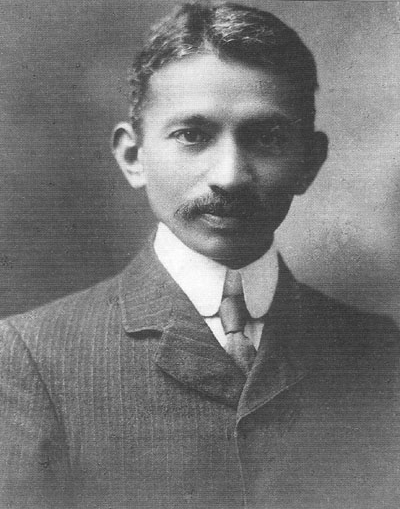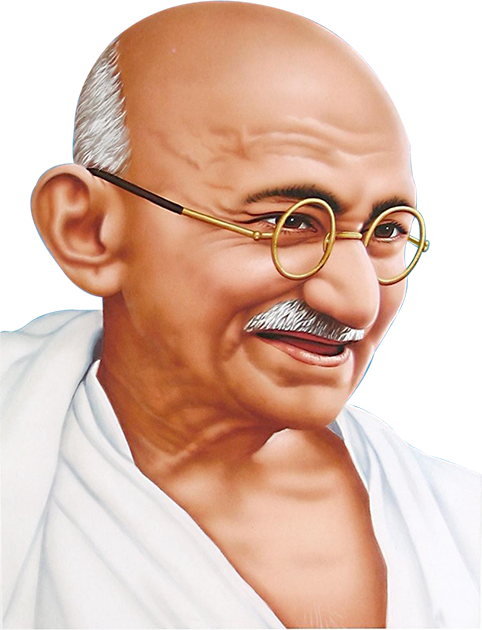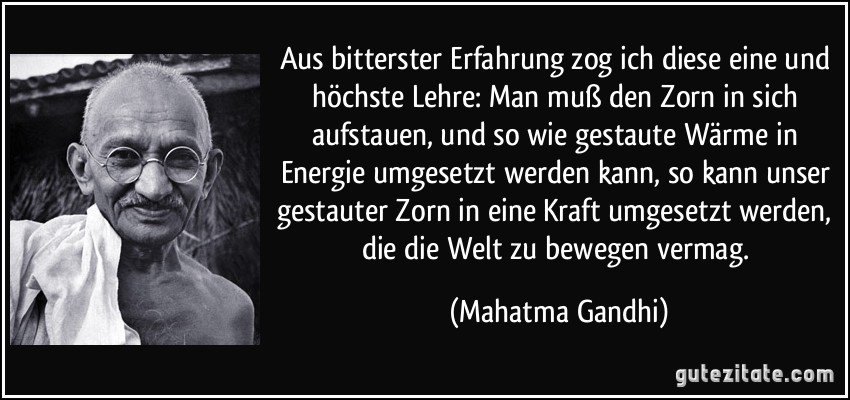
Wiki / MahatmaGandhi
Inhaltsverzeichnis: (verbergen)
 Mahatma Gandhi, South Africa, 1909 |
|
Erst ignorieren sie dich,
|
Mahatma Gandhi [sanskrit: महात्मा, mahātmā, deutsch: Große Seele] war ein indischer Politiker, Anwalt und Reformator, Freiheitskämpfer. Als Führer der indischen Unabhängigkeitsbewegung war er Verfechter des gewaltlosen Widerstands zur Durchsetzung politischer Ziele. Mahatma Gandhi spirituelle Inspirationsquelle war die Bhagavadgita. Sein Lieblingsmantra lautete: Rama = beständige Freude.
Gandhis Schlüsselerlebnis
1893 wanderte der junge Rechtsanwalt Mohandas Karamchand Gandhi in Durban in Südafrika ein.
Auf eine seiner ersten Reisen von Durban nach Johannesburg löste er am eine Bahnfahrkarte 1. Klasse-Ticket. Auf halber Strecke warf ihn der Schaffner aus dem Zug, da die weißen Reisenden der 1. Klasse keine indischen Passagiere duldeten.
Er verbrachte eine ganze Nacht im kalten Aufenthaltsraum des Bahnhofs Pietermaritzburg. Er sann dabei über Wege zur Gerechtigkeit nach. Dies führte dazu, dass er eine Doktrin des Passiven Widerstands verfasste.

Kurz vor seiner Ermordung im Januar 1948 gab der indische Weise Mahatma Gandhi sein letztes Interview.
Ein junger Reporter der Zeitung The Times of India (TOI) befragte ihn:
Gandhis Antwort lautete:
| Quelle: ► Dr. Stephan A. Schwartz, US-amerikanischer Kognitionswissenschaftler, Trend- und Zukunftsforscher, Samueli Institute, Laboratories for Fundamental Research, Autor, Referenz: gelöschter (engl.) Artikel Gandhi on why the British chose to leave India, veröffentlicht von Gandhitopia.org, 6. Februar 2009 |
| Source: ► Video interview with Stephan A. Schwartz, Ph.D., US American futurologist, senior fellow for Brain, Mind and Healing, Samueli Institute, cognitive sciences research associate, Laboratories for Fundamental Research, author, Non-Violence With Stephan A. Schwartz, presented by the US American New Thinking Allowed TV, host Jeffrey Mishlove, Ph.D. (*1946) US American clinical psychologist, director of the Intuition Network, radio and television interviewer, author, recorded on 5. February 2017, YouTube film, 28:00 minutes duration, posted 6. August 2017 |
| Siehe auch: ► Essenz und ► Charisma und ► Das Wesen des Zauns |
| See also: ► The Essence of Beingness |
Persönliche Bekenntnisse
Den Gott im Mitmenschen ehren: Einer Überlieferung zufolge soll M. Gandhi auf die Nachfrage des theoretischen Physikers
Albert Einstein, was der indische Gruß Namaste ausdrücke, so geantwortet haben.
Original zitiert in (nach Hinweis von Radhakrishna), präsentiert von der indischen Tageszeitung Young India, S. 1078-1079, 1925
Empfehlungen

Schlussfolgerung
Hege nie Zweifel daran, dass eine kleine Gruppe aufmerksamer und engagierter Bürger die Welt verändern können. Tatsächlich sind es die einzigen, welche es überhaupt je getan haben. Zugeschrieben Margaret Mead (1901-1978) US-amerikanische Kulturanthropologin, Soziologin, Biologin, Ethnologin, Referentin, Schriftstellerin, zitiert in: Frank G. Sommers, Tana Dineen, Curing Nuclear Madness, S. 158, Methuen, 1984
|
Personal avowals
Gandhi's mother Putlibai and his wife Kasturba influenced his path greatly.
Gandhi's prayer solution meets escalation of physical force with soul force. It overcomes the tendency toward fear and flight. It is constructive as well as a form of resistance.
Questions
Natural ⇔ habitual
Latin: "Cum dilectione hominum et odio vitiorum." by Saint Augustine, letter 211, 424
Gandhi hinted that he could quote even stronger passages from the Hindu scriptures. The lesson here is: If we could clean our houses, palaces and temples of the attributes of wealth and show in them the attributes of morality we could fight all hostile forces without military strength. He recommended to seek first the Kingdom of God and his righteousness and everything will be added upon the seeker.
The dignity approach: At the occasion of the Indian independance day, 15. August 1947, cheering people tried to touch Gandhi's feet in respect. He, however, never allowed such gestures of reverence.
Gandhi had learned "Don't bow before another person" from the Quaker William Penn.
Levels: Thinking – Doing – Being
Poverty is not the symptom. Poverty is the symptom of the problem. Video presentation by Thom Hartmann thomhartmann.com (*1951) US American former psychotherapist and entrepreneur, radio host of Air America, progressive political commentator, journalist, author, The more equality a society has, the better it does, referencing income inequality researcher Richard Wilkinson, Ph.D. (*1943) British professor emeritus of social epidemiology, University of Nottingham, YouTube film, minute 1:37, 9:01 minutes duration, posted 28. July 2009
|
Persönliches Bekenntnis
25 Jahre nach Abschluss der Satyagraha-Kampagne, 1939
Personal avowal
Churchill's Empire. The World That Made Him and the World He Made'', St. Martin's Griffin, 2010, reprint edition 19. July 2011
Regret – Insight
|
In reference to Gandhi's quote: A small body of determined spirits fired by an unquenchable faith in their mission can alter the course of history.
Gandhi often confirmed that the paternal society is the root of inequality. When he ordered his wife Kasturba to clean a public toilet it resulting in a severe spousal conflict. He felt ashamed about his behavior. From then on he took care not to humiliate her anymore for the rest of his life.
Juxtaposing Gandhi ⇔ Luther King Jr.
|
| Source: ► Blog entry by Henrik Edberg, 10 Fundamentals for Changing the World, presented by Positivity Blog, 9. May 2008 |
Mahatma Gandhi's insight conveyed in his last interview
| |||||||
| Sources featuring Stephan A. Schwartz, Ph.D., US American futurologist, senior fellow for Brain, Mind and Healing, Samueli Institute, cognitive sciences research associate, Laboratories for Fundamental Research, author ► Deleted article Gandhi on why the British chose to leave India, published by Gandhitopia.org, 6. February 2009 ► Video interview Non-Violence With Stephan A. Schwartz, presented by the US American New Thinking Allowed TV, host Jeffrey Mishlove, Ph.D. (*1946) US American clinical psychologist, director of the Intuition Network, radio and television interviewer, author, recorded on 5. February 2017, YouTube film, 28:00 minutes duration, posted 6. August 2017 |
| See also: ► Charisma and ► Essence and ► The essence of the fence |
| Siehe auch: ► Das Wesen des Seins – Essenz |
| |||||||||||||||||||
| See also: ► Eight statistically confirmed laws of social change as exemplified by the Quakers |
The chain of essential social reformers was inspired by the Quakers.
The Indian Hindu sage and spiritual activist leader Mohandas Karamchand Mahatma Gandhi brought together
The resulting fusion of all three elements changed the face of the twentieth century.
Following the Eight statistically confirmed laws of social change the Society of Friends was successfully involved in six US reformation movements.
The dignity approach: At the occasion of the Indian independance day, 15. August 1947, cheering people tried to touch Ghandi's feet in respect. He, however, never allowed such gestures of reverence.
Gandhi had learned the maxime "Don't bow before another person" from the Quaker William Penn.
Albert Einstein was inspired by Mohandas Gandhi. Newsreel after newsreel he watched of Gandhi's doings in India. Having seen Gandhi greet people in the street with his hands placed together, as if in prayer, and with a bow, he wondered what Gandhi was saying.
| Source: ► Rita Banerji, Indian philosopher, photographer, gender activist, feminist author, Sex and Power. Defining History, Shaping Societies, S. 265-281, Penguin Books India, 2008, Penguin Global, 15. April 2009 |
| Reference: ► Article Thrill of the chaste: The truth about Gandhi's sex life, presented by the centre-left British online newspaper The Independent, 2. January 2012 |
|
When he was assassinated in January 1948, it was with Manu and Abha by his side. Despite her having been his constant com- panion in his last years, family members, tellingly, removed Manu from the scene. Gandhi had written to his son: "I have asked her to write about her sharing the bed with me," but the protectors of his image were eager to eliminate this element of the great leader's life. Devdas, Gandhi's son, accompanied Manu to Delhi station where he took the opportunity of instructing her to keep quiet.
Questioned in the 1970s, Sushila revealingly placed the elevation of this lifestyle to a brahmacharya experiment was a response to criticism of this behaviour. "Later on, when people started asking questions about his physical contact with women – with Manu, with Abha, with me – the idea of brahmacharya experiments was developed […] in the early days, there was no question of cal- ling this a brahmacharya experiment." It seems that Gandhi lived as he wished, and only when challenged did he turn his own preferences into a cosmic system of rewards and benefits. Like many great men, Gandhi made up the rules as he went along. |
| Source: ► Article An odd kind of piety: The truth about Gandhi's sex life, presented by the centre-left British online newspaper The Independent, 2. January 2012 "Gandhi was sex-mad," Jad Adams, Gandhi’s biographer "Gandhi is a most dangerous, semi-repressed sex maniac," pre-independence prime minister of the Indian state of Travancore |
Links zum Thema Mahatma GandhiLiteratur
Literature (engl.)
Critical literature
Externe Weblinks
External web links (engl.)
On Gandhi's efforts to involve women in all phases of development, including the struggle for India's freedom
⚡ Critical external web links (engl.)
With religious chastity under scrutiny, a new book throws light on Gandhi's practice of sleeping next to naked girls. In fact, he was sex-mad,
While having the girls and women sleep naked with him was in and of itself a form of sexual abuse – a privilege Gandhi exercised because of his position and stature, what actually took place in his bed remains hidden, because the women were sworn to secrecy.
"Gandhi had met Blavatsky and Besant in 1889. And when Gandhi set up his office in Johannesburg, among the pictures he hung on his walls were those of Tolstoy, Jesus Christ and Annie Besant, and in a letter he wrote to her in 1905 he expressed his "reverence" of her. Besant bestowed on him the title by which he became famous, "Mahatma,” a Hindu term for "Great Soul,” and the same name by which Theosophy called its own masters. Besant's distinctive influence on Gandhi was through her contribution to theory was the "Law of Sacrifice," which was set out most fully in Esoteric Christianity. The Law of Sacrifice was derived from a Fabian reading of the Bhagavad Gita, where Krishna's selfless activity brought the world into existence and continues to sustain it. Action performed in this "sacrificial" spirit, says Krishna, is free from Karma. From this Besant developed the notion of the Law of Sacrifice, a form of "spiritual alchemy," through disinterested action, "cast upon the altar of duty."
Audio- und Videolinks
Audio and video links (engl.)
Gandhi doesn't refer to pacifism. His approach towards a regime of colonialism is non-violent non-cooperation.
Critical media offerings
Audio and video links (engl.) – David R. Hawkins
Film- und Dokumentationslinks
Movie and documentary links (engl.) Trailer to the biopic of one of the most powerful people in the world starring Ben Kingsley as Gandhi: Through his ultimate trial Gandhi was the conscience for all mankind.
|
Englisch Wiki
Hawkins